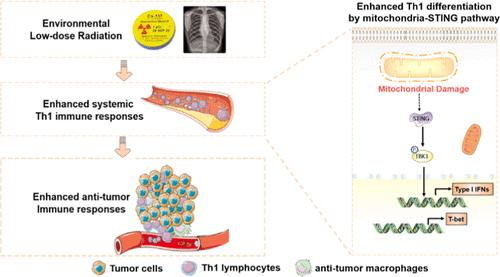当前位置:
X-MOL 学术
›
Environ. Sci. Technol.
›
论文详情
Our official English website, www.x-mol.net, welcomes your
feedback! (Note: you will need to create a separate account there.)
Environmental Low-Dose Radiation Activates Th1 Immunity through the Mitochondria-STING Pathway
Environmental Science & Technology ( IF 10.8 ) Pub Date : 2024-12-17 , DOI: 10.1021/acs.est.4c08009 Xiuxiu Yao, Wendi Huo, Yuchen Wang, Dongfang Xia, Yan Chen, Yuhua Tang, Huayong Tang, Wenjiang Yang, Yu Liu, Jingquan Xue, Qing Yuan, Xueyun Gao, Kai Cao
Environmental Science & Technology ( IF 10.8 ) Pub Date : 2024-12-17 , DOI: 10.1021/acs.est.4c08009 Xiuxiu Yao, Wendi Huo, Yuchen Wang, Dongfang Xia, Yan Chen, Yuhua Tang, Huayong Tang, Wenjiang Yang, Yu Liu, Jingquan Xue, Qing Yuan, Xueyun Gao, Kai Cao

|
The presence of low-dose radiation (LDR) in the environment has become more prevalent. However, the effect of LDR exposure on the immune system remains elusive. Here, we interestingly found that LDR specifically elevated the percentage of CD4+IFNγ+ Th1 splenocytes, both in vitro and in vivo, without affecting the percentage of CD8+IFNγ+ Tc1 cells and regulatory T cells. A similar phenomenon was found in T cells from peripheral blood. Mechanistically, we found that LDR can induce mitochondrial damage, which stimulated the STING signaling pathway, leading to the enhanced expression of T-bet, the master transcriptional factor of Th1-cell differentiation. The specific STING signal inhibitor can abrogate the effect of LDR on Th1 differentiation, confirming the central role of the STING pathway. To further validate the immunoregulatory role of LDR, we exposed mice with whole body LDR and evaluated if LDR could protect mice against triple-negative breast cancer through enhanced antitumor immunity. As expected, LDR significantly delayed tumor development and promoted cell death. Meanwhile, LDR resulted in increased tumor-infiltrating Th1 cells, while the proportion of Tc1 and Treg cells remained unchanged. Furthermore, the infiltration of antitumor macrophages was also increased. In summary, we revealed that environmental LDR could specifically regulate Th1 T-cell activities, providing critical information for the potential application of LDR in both clinical and nonclinical settings.
中文翻译:

环境低剂量辐射通过线粒体-STING 通路激活 Th1 免疫
环境中低剂量辐射 (LDR) 的存在变得越来越普遍。然而,LDR 暴露对免疫系统的影响仍然难以捉摸。在这里,我们有趣地发现 LDR 在体外和体内特异性地提高了 CD4+IFNγ+Th1 脾细胞的百分比,而不影响 CD8+IFNγ+Tc1 细胞和调节性 T 细胞的百分比。在外周血的 T 细胞中也发现了类似的现象。从机制上讲,我们发现 LDR 可以诱导线粒体损伤,从而刺激 STING 信号通路,导致 Th1 细胞分化的主要转录因子 T-bet 的表达增强。特异性 STING 信号抑制剂可以消除 LDR 对 Th1 分化的影响,证实了 STING 通路的核心作用。为了进一步验证 LDR 的免疫调节作用,我们用全身 LDR 暴露了小鼠,并评估了 LDR 是否可以通过增强抗肿瘤免疫来保护小鼠免受三阴性乳腺癌的侵害。正如预期的那样,LDR 显着延迟了肿瘤发展并促进了细胞死亡。同时,LDR 导致肿瘤浸润性 Th1 细胞增加,而 Tc1 和 Treg 细胞的比例保持不变。此外,抗肿瘤巨噬细胞的浸润也增加。综上所述,我们揭示了环境 LDR 可以特异性调节 Th1 T 细胞活性,为 LDR 在临床和非临床环境中的潜在应用提供关键信息。
更新日期:2024-12-18
中文翻译:

环境低剂量辐射通过线粒体-STING 通路激活 Th1 免疫
环境中低剂量辐射 (LDR) 的存在变得越来越普遍。然而,LDR 暴露对免疫系统的影响仍然难以捉摸。在这里,我们有趣地发现 LDR 在体外和体内特异性地提高了 CD4+IFNγ+Th1 脾细胞的百分比,而不影响 CD8+IFNγ+Tc1 细胞和调节性 T 细胞的百分比。在外周血的 T 细胞中也发现了类似的现象。从机制上讲,我们发现 LDR 可以诱导线粒体损伤,从而刺激 STING 信号通路,导致 Th1 细胞分化的主要转录因子 T-bet 的表达增强。特异性 STING 信号抑制剂可以消除 LDR 对 Th1 分化的影响,证实了 STING 通路的核心作用。为了进一步验证 LDR 的免疫调节作用,我们用全身 LDR 暴露了小鼠,并评估了 LDR 是否可以通过增强抗肿瘤免疫来保护小鼠免受三阴性乳腺癌的侵害。正如预期的那样,LDR 显着延迟了肿瘤发展并促进了细胞死亡。同时,LDR 导致肿瘤浸润性 Th1 细胞增加,而 Tc1 和 Treg 细胞的比例保持不变。此外,抗肿瘤巨噬细胞的浸润也增加。综上所述,我们揭示了环境 LDR 可以特异性调节 Th1 T 细胞活性,为 LDR 在临床和非临床环境中的潜在应用提供关键信息。






























 京公网安备 11010802027423号
京公网安备 11010802027423号